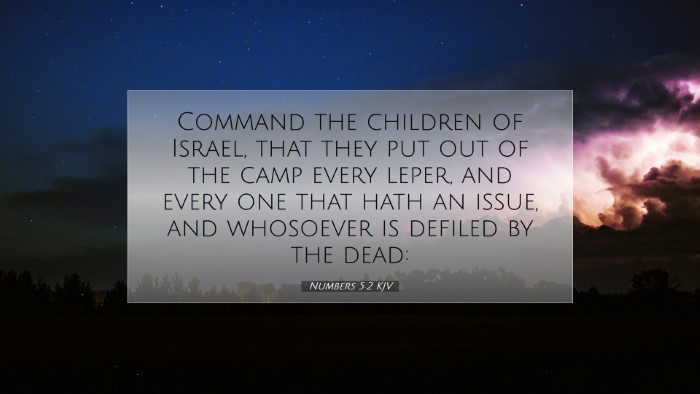Commentary on Numbers 5:2
Verse Reference: Numbers 5:2 - "Command the Israelites to send away from the camp anyone who has leprosy or a discharge of any kind or who is ceremonially unclean because of a dead body."
Introduction
Numbers 5:2 addresses an important aspect of Israelite community life as directed by God through Moses. The command to send away individuals who are ceremonially unclean serves as a strong illustration of the purity laws that are prevalent throughout the Old Testament. Understanding this verse requires a deep dive into the implications of ceremonial cleanliness, community health, and moral purity.
Contextual Analysis
In the context of the Book of Numbers, this directive emerges amidst a reiteration of laws concerning purity and sanctity among the Israelites. The Israelites are on their journey through the wilderness, and maintaining a community that is acceptable to God is crucial for their identity as His chosen people.
The Nature of Uncleanness
Leprosy: Often associated with physical ailments that symbolize sin and moral decay, leprosy represents the isolation that is necessary for both physical health and spiritual integrity (Matthew Henry). The laws concerning lepers (Leviticus 13) dictate that those afflicted must live outside the camp, which underscores the seriousness of impurity within the covenant community.
Discharges of Any Kind: The reference to discharges speaks to various bodily conditions that rendered an individual ceremonially unclean (Albert Barnes). This requires a broader understanding of human conditions and the broader perspective on health and wellness in relation to ritual. The ancient Israelites were highly attuned to the physical state of an individual's body as reflective of their spiritual state.
Uncleanness Due to a Dead Body: The mention of a dead body stands as a potent symbol of death and the effects of sin (Adam Clarke). In a community that centers on holiness, contact with death is strictly regulated, emphasizing that holiness involves separation from death, which is often viewed as the ultimate representation of sin's consequence.
Theological Implications
Theological reflection on this verse reveals several significant aspects:
- Holiness of God: God's holiness necessitates that His people be holy (Leviticus 11:44). The directive in Numbers 5:2 highlights the importance of purity in relation to divine presence and blessings.
- Community Wholeness: Removing the unclean promotes communal health and spiritual wholeness. The well-being of the community directly reflects the state of its members’ adherence to divine laws (Albert Barnes).
- Foreshadowing Redemption: While the separation appears harsh, it foreshadows the ultimate redemption found in Christ, who cleanses not just the outward appearance but the heart (Matthew Henry). The New Testament extends the understanding of cleanliness beyond ritual to moral and spiritual integrity.
Cultural and Practical Applications
This directive also carries applications for modern faith communities:
- Importance of Cleanliness: The physical and spiritual cleanliness of the church body holds profound relevance today. Just as ancient Israel had laws to maintain communal integrity, contemporary churches must consider how to deal with moral impurities.
- Grace Shared with Restoration: The task of maintaining purity should also be balanced with grace. Just as restoration for sinners is emphasized in the New Testament, the church today should welcome and restore those who are spiritually unwell while guiding them towards health and wholeness.
- Community Responsibility: This verse compels faith communities to foster a shared sense of responsibility regarding holiness and support one another in pursuit of a life that is pleasing to God (Adam Clarke).
Conclusion
Numbers 5:2 serves not only as a historical account of Israel’s purity laws but also offers timeless principles for believers today. The call to holiness resounds through centuries, urging communities of faith to recognize the vital intersection of health, morality, and divine presence. Each element of this command enriches our understanding and application of God's desire for His people to be set apart, reflecting His character in the world.


